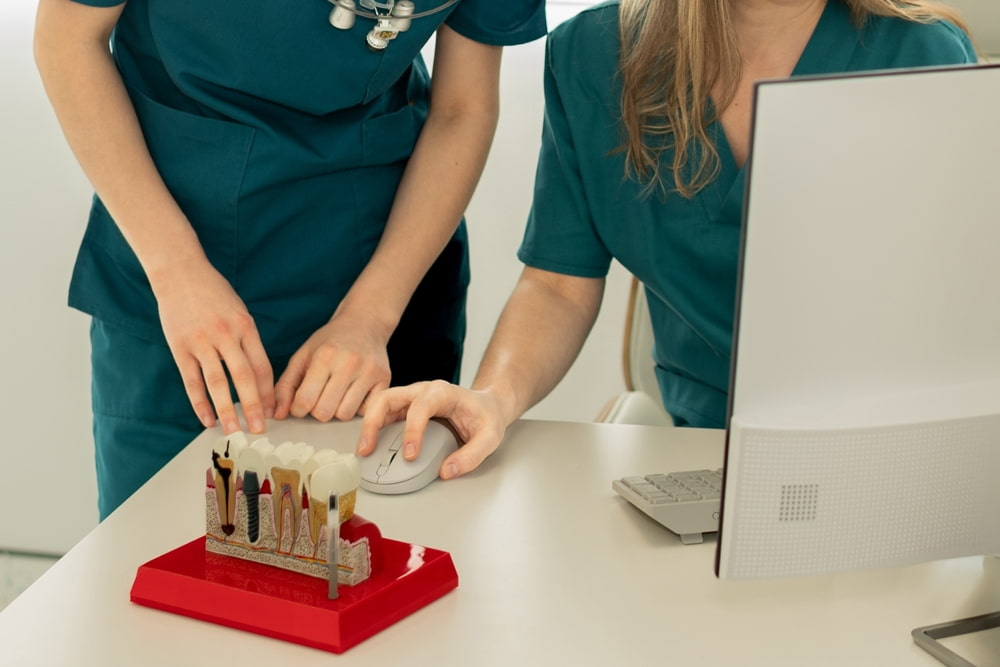What Is an Implantologist & How Do They Differ From a General Dentist?

Many types of dentists exist in the dental care field.
There are “general” dentists and there are ‘specialist’ dentists.
For instance, general dentists are trained to do most treatments to a high standard but occasionally they may refer you to a specialist that can handle more complex treatments. For example, a specialised dentist - like an implantologist - has received advanced training that focuses on particular procedures having to do with teeth replacement.
In this article, you’ll learn what an implantologist is, how they differ from a general dentist, and why you need one if you are going to have a dental implant.
What Are Dental Implants?
Before breaking into pieces the actual work of an implantologist, we’ll share some basic knowledge about dental implants.
Dental implants are, in simple terms, substitutes for real teeth roots. Made of titanium, they resemble tiny screws and are placed in the jaw bone after a tooth is extracted or has been lost.
Their purpose is to serve as a base, a strong anchor upon which a crown, a bridge, or a denture is screwed to restore a missing tooth. Their most important benefit is that they bond with the bone, providing a firm foundation for an artificial tooth and securing the jawline.
Dental implants are placed surgically by a dentist. But in this case, not a general dentist. This dental surgery typically requires an implantologist.
Which brings us to the next section.
What Is an Implantologist?
An implantologist is a dental specialist who focuses primarily on the placement, maintenance, and restoration of dental implants.
Implantologists are general dentists who have received extensive additional training beyond standard dental qualifications.
This training includes postgraduate education, and specialised courses in oral surgery, bone grafting, and advanced implantology techniques.
With their expertise, they can handle complex cases, such as patients who have experienced significant bone loss or require multiple implants.
Their goal is to ensure the implants are properly placed so they integrate seamlessly with the jawbone for long-term function and aesthetics, allowing patients to regain confidence in their smile.
What Does an Implantologist Do?
There is a wide range of complementary procedures from initial examination and consultation to post-treatment monitoring and care.
Here is a breakdown of the key tasks:
· Evaluating the patient’s condition (this involves taking X-rays and other scans and consulting the general dentist, orthodontist or other practitioner).
· Conducting surgery to place the dental implants and apply final restorations.
· Working through any necessary adjustments to ensure optimal fit.
· Replacing crowns, bridges, and dentures or ordering any needed repairs.
· Providing post-treatment care and monitoring the process of the implant bonding with the jaw.
· Staying updated on scientific developments in the dental implant field (either by attending conferences, seminars or studying bibliography).
What Does a General Dentist Do?
On the other hand, a general dentist provides care for a wide range of oral health needs using simpler techniques.
General dentists are responsible for routine dental procedures aiming to maintain overall oral health, including:
· Regular check-ups and cleanings
· Teeth fillings to treat cavities
· Basic restorative treatments (such as crowns and bridges)
· Teeth extractions
· Preventive advice and care.
General Dentist vs Implantologist - Key Differences

To summarise the differences between a general dentist and an implantologist these can be found in:
Specialisation and Training
An implantologist receives advanced, specialised training to master implant placement, bone grafting, and complex surgical procedures. While a general dentist provides broader, routine dental care but lacks deep expertise in implant-related treatments.
Scope of Work
Implantologists deal with patients who need dental implants and often deal with bone density. On the contrary, general dentists handle a wide range of dental issues, including preventive care, routine check-ups and cleanings, fillings, etc.
Costs and Fees
Typically, an implantologist will charge more for the treatments they provide than a general dentist. However, this is completely justifiable due to their expertise and the complex nature of their work.
Collaboration
Implantologists tend to take charge of a patient after a general dentist has evaluated their case. They then collaborate with general dentists to provide personalised and holistic care to meet the patient’s needs.
FAQs
1. Can a General Dentist Place Dental Implants?
They can, but it is recommended to be done by a specialist.
Some general dentists indeed offer dental implants as part of their services, particularly for straightforward cases.
However, they will usually refer patients to an implantologist since their training is more advanced and allows them to manage difficult procedures and ensure the best outcome.
2. Do I Need to See an Implantologist for my Missing Teeth?
Yes.
Your general dentist can give you a first consultation but the real expertise lies with the implantologist. They will first tell you whether you qualify for a dental implant or not. And if you do, they will take care of the whole procedure from A to Z.
3. What Additional Training Does an Implantologist Have?
An implantologist typically completes additional postgraduate training in implantology, oral surgery, and bone grafting. This advanced training offers them their speciality and distinguishes them from general dentists and other types of dentists. With this training, they can manage complex implant procedures and other demanding treatments that a general dentist may not be equipped to handle.
4. Will my General Dentist and Implantologist Work Together?
They will collaborate.
Usually, your general dentist will refer you to an implantologist for the surgical placement of implants. After the implants are in place, the general dentist may take over the final restoration, such as fitting crowns or bridges, ensuring you receive holistic care throughout the process.
So, if you need a dental implant, consider visiting an implantologist - instead of a general dentist, to ensure you receive the best possible treatment from a specialised dentist.
If you’re in the market for teeth whitening, consult Enlighten Smile’s extensive list to find the dental expert in your area who can handle your oral health effectively and guarantee the outcome.
› DIG DEEPER ‹
![]()
Learn more about the Enlighten Teeth Whitening System HERE.
And to find an Enlighten whitening expert near you, hit the link below.
FIND A DENTIST

Or if it’s mini smile makeovers you want to dig deeper into, then give it a click right HERE.
_________________________________________________________________________






